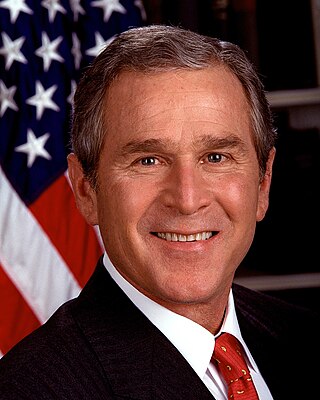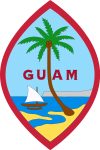
Each of the 50 U.S. states, the District of Columbia, and territories of the United States holds either primary elections or caucuses to help nominate individual candidates for president of the United States. This process is designed to choose the candidates that will represent their political parties in the general election.

The Iowa caucuses are quadrennial electoral events for the Democratic and Republican parties in the U.S. state of Iowa. Unlike primary elections, where registered voters cast ballots at polling places on election day, Iowa caucuses are meetings where voters gather to discuss and select candidates for their registered party. Political parties hold the caucuses, in contrast to most state-run primaries. Both presidential and midterm elections in Iowa use caucuses. The caucuses are also held to select delegates to county conventions and party committees, among other party activities.
Guam elects on the territorial level a governor and a legislature with the governor elected for a four-year term by the people. The Legislature of Guam has fifteen members elected at large in an open primary for two year terms.

The Nevada presidential caucuses are an electoral event in which citizens met in precinct caucuses to elect delegates to the corresponding county conventions. In 2021, Harry Reid passed legislation (AB321) to include primaries in hopes of increasing voter turn-out. Nevada has for decades and still does have a caucus. The caucus is where the delegates receive the votes that will be carried to the National Convention and not the primaries. There are 17 counties in Nevada and the state has 26 delegates. The Nevada caucuses began in 1981. The Kerry/Dean caucus was held on February 14, 2004. In 2008 the DNC gave Nevada the official first in the west status reflecting the growing importance of the West as well as Nevada's electoral bellwether status. The 2008 Nevada caucuses were the third major electoral event in the nominating process for President of the United States. In 2016, the Democratic caucus was held on February 20 and the Republican caucus was held on February 23.
The following is a timeline of major events leading up to the United States presidential election of 2012. The election was the 57th quadrennial United States presidential election and was held on November 6, 2012.

Voters of the Republican Party elected state delegations to the 2012 Republican National Convention in presidential primaries. The national convention then selected its nominee to run for President of the United States in the 2012 presidential election. There were 2,286 delegates chosen, and a candidate needed to accumulate 1,144 delegate votes at the convention to win the nomination. The caucuses allocated delegates to the respective state delegations to the national convention, but the actual election of the delegates were, many times, at a later date. Delegates were elected in different ways that vary from state to state. They could be elected at local conventions, selected from slates submitted by the candidates, selected at committee meetings, or elected directly at the caucuses and primaries.

Presidential primaries and caucuses were organized by the Democratic Party to select the 4,051 delegates to the 2016 Democratic National Convention held July 25–28 and determine the nominee for president in the 2016 United States presidential election. The elections took place within all fifty U.S. states, the District of Columbia, five U.S. territories, and Democrats Abroad and occurred between February 1 and June 14, 2016.

Presidential primaries and caucuses of the Republican Party took place within all 50 U.S. states, the District of Columbia, and five U.S. territories between February 1 and June 7, 2016. These elections selected the 2,472 delegates that were sent to the Republican National Convention. Businessman and reality television personality Donald Trump won the Republican nomination for president of the United States.
The following is a timeline of major events leading up to, during, and after the 2016 United States presidential election. The election was the 58th quadrennial United States presidential election, held on November 8, 2016. The presidential primaries and caucuses were held between February 1 and June 14, 2016, staggered among the 50 states, Washington, D.C., and U.S. territories. The U.S. Congress certified the electoral result on January 6, 2017, and the new president and vice president were inaugurated on January 20, 2017.

This article contains the results of the 2016 Republican presidential primaries and caucuses, the processes by which the Republican Party selected delegates to attend the 2016 Republican National Convention from July 18–21. The series of primaries, caucuses, and state conventions culminated in the national convention, where the delegates cast their votes to formally select a candidate. A simple majority (1,237) of the total delegate votes (2,472) was required to become the party's nominee and was achieved by the nominee, businessman Donald Trump of New York.
The 2016 Guam Republican presidential caucuses took place on March 12 in the U.S. territory of Guam as one of the Republican Party's primaries ahead of the 2016 presidential election.

The 2020 Indiana Democratic presidential primary had been scheduled to take place on May 5, 2020, but was postponed to June 2 due to the COVID-19 pandemic, alongside seven delayed and regular primaries on that day in the Democratic Party primaries for the 2020 presidential election. The Indiana primary was an open primary, with the state awarding 89 delegates to the 2020 Democratic National Convention, of whom 82 were pledged delegates allocated on the basis of the primary results.

The 2020 South Dakota Democratic presidential primary took place on June 2, 2020, as one of eight delayed and regular primaries on the same day in the Democratic Party primaries for the 2020 presidential election. The South Dakota primary was a semi-closed primary, with the state awarding 21 delegates to the 2020 Democratic National Convention, of whom 16 were pledged delegates allocated on the basis of the primary results.

Although the Northern Mariana Islands did not participate in the 2020 presidential election because it is a U.S. territory and not a state, it still participated in the U.S. presidential primaries and caucuses. Senator Bernie Sanders won the Democratic caucus, held on March 14, which would be his last win in the 2020 primary season. The Republican caucus, held on March 15 during the party's commonwealth convention, unanimously voted for incumbent President Donald Trump.

Although the United States Virgin Islands did not participate in the 2020 presidential election because it is a U.S. territory and not a state, it still participated in the U.S. presidential caucuses and primaries. Former vice president Joe Biden won the Democratic caucuses, held on June 6. The Republican caucuses, held on March 14 in the form of a territorial convention, voted for incumbent president Donald Trump.
This is a timeline of major events leading up to, during, and after the 2024 United States presidential election. This will be the first presidential election to be run with population data from the 2020 census. In addition to the dates mandated by the relevant federal laws such as those in the U.S. Constitution and the Electoral Count Act, several milestones have consistently been observed since the adoption of the conclusions of the 1971 McGovern–Fraser Commission.

Although Guam did not participate in the 2020 presidential election because it is a U.S. territory and not a state, it still participated in the U.S. presidential primaries and caucuses. Former vice president Joe Biden won the Democratic caucus, held on June 6. The Republican caucus, held on March 14 in the form of a "state convention", endorsed incumbent President Donald Trump.

The 2000 Guam Democratic presidential caucuses were held on March 18, 2000, as part of the 2000 Democratic Party primaries for the 2000 presidential election. 6 delegates to the 2000 Democratic National Convention were allocated to the presidential candidates.

The 2000 Guam Republican presidential caucuses were held on February 26, 2000, as part of the 2000 Republican Party primaries for the 2000 presidential election. 4 delegates to the 2000 Republican National Convention were allocated to the presidential candidates. The contest was alongside primaries in American Samoa and Virgin Islands.

Although Guam will not participate in the 2000 presidential election because it is a U.S. territory and not a state, it can participate in the U.S. presidential primaries and caucuses for both the Democratic and Republican parties, also Guam instead uses the presidential straw poll on Election Day.
















